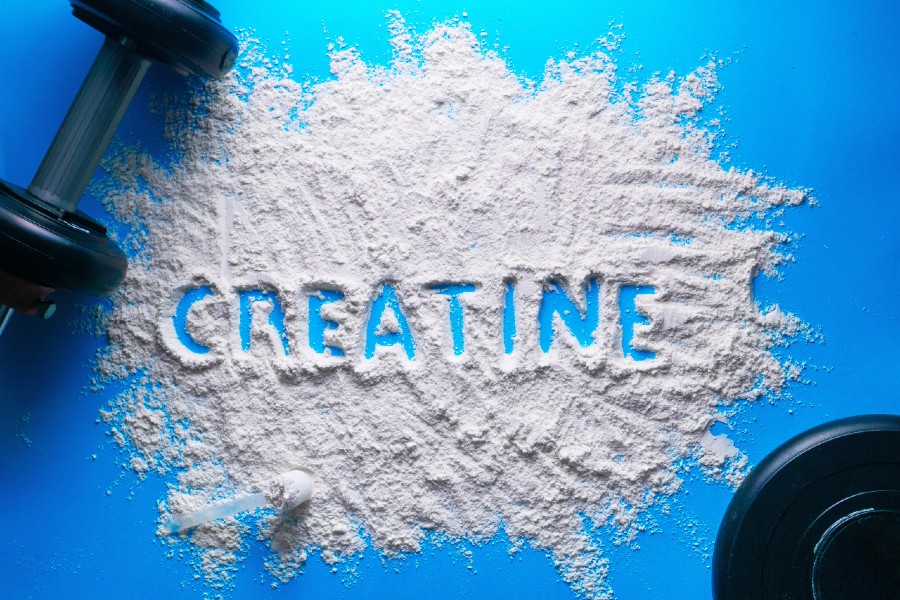What is creatine and what does it do?
Why is creatine so popular?
This is a quick overview of why creatine has held such a long-standing role as the king of athletic supplements. Creatine is a naturally occurring non-protein amino acid providing vital energy to muscles and the brain during high-intensity exercises such as sprinting or deadlifting. Athletes and bodybuilders use it as a dietary supplement to increase muscle mass, strength, and performance. The International Society of Sports Nutrition (ISSN) concluded from multiple studies that; creatine is “the most effective nutritional supplement currently available to athletes in terms of increasing high-intensity exercise capacity and lean body mass during training.”
During strenuous exercise, your body rapidly depletes its stores of ATP (adenosine triphosphate) to release energy. ATP contracts your muscles, synthesises proteins, and transmits nerve impulses. Your muscle mass has a limited supply of ATP, and creatine supplements act as a quick regenerative agent to provide bursts of energy. Proper creatine supplementation combined with resistance training can build muscle more efficiently over a shorter time. Creatine may also help mitigate muscle damage in between rounds of intense exercise.

What are the benefits of creatine?
The most researched and well-known athletic benefits of creatine are;
- Increased energy during maximum training effort
- Better overall athletic performance
- Increase in lean muscle mass and muscle growth
- Decreased mental fatigue during times of stress
Beyond the apparent benefits of creatine for enhancing sports performance, there are many other positives to supplementing with this amino acid. Among the most appealing are; the potential to lower cholesterol and regulate blood lipid levels, reduce fat storage in the liver, minimise the risk of heart disease, and help improve glycaemic control. Creatine also shows promise in enhancing cognitive function in older adults and reducing the growth of some cancers. Creatine is a crucial energy source for your immune cells to function well.
Although there have not been as many studies done including women, emerging science supports claims that creatine may play a beneficial role in women’s health through all adult stages of life;
- Women starting a new training program consuming 5 grams of creatine daily saw improvements of up to 25% in muscular strength after ten weeks of continuous strength training.
- Creatine may counteract the decline in muscle mass, strength, and bone loss associated with menopause.
- The incidence of depression may be higher in women with lower creatine stores in their bodies. Creatine, taken at 5 grams a day, may improve brain energetics and neurotransmitter response to help alleviate symptoms of depression induced by hormonal mood swings.
Vegetarians and vegans are reported to have muscle creatine stores 20–30% lower than non-vegetarians. Creatine is only naturally occurring in animal products. Even a meat eater would have to consume over a kilogram of beef or fish daily to achieve optimal levels of creatine storage. With that in mind, imagine the shortages a vegan may have in their system. Athletes adhering to a vegetarian or vegan diet will have lower levels than those eating meat. One study shows that vegetarians who started with much lower creatine levels than average benefitted from the supplement more over 8 weeks than their meat-eating peers. In another study, vegetarians excelled in memory and intelligence testing after weeks of supplementing. There are vegetarian and vegan-friendly lab-produced creatine supplements available.

Is there a natural form of creatine?
Creatine is naturally occurring in meats. Cooking meat does lower the amount of bioavailable creatine in it, so when possible (for example, a steak), cook at a lower temperature to maintain higher creatine levels.
If you want to infuse your diet with creatine-rich foods, here are some of the choices that have the highest levels;
- Fish (such as herring, cod, and salmon)
- Red meat such as beef or lamb
- Chicken
- Rabbit
- Pork
Is creatine safe?
Creatine is the most well-accepted and utilised athletic supplement out there. It has been rigorously studied in dozens of ways for decades. The supplement gained widespread popularity after the 1992 Olympics in Barcelona and has been a gold standard for serious athletes ever since. Creatine use is gaining momentum among other more casual consumers because of its well-documented benefits.
With all this positivity set aside for a moment, creatine in high doses is most likely unsafe and could damage your liver, kidneys, and heart. Taking the supplement at too high a dose for long periods could also affect your body’s ability to produce creatine independently.
Creatine supplements can cause side effects such as diarrhoea, dizziness, weight gain, and dehydration in some people. If you plan to start the supplement, stay within the standard parameters set for safe use.
You may have heard of creatine loading. This is a practice of taking the supplement several times daily for 5 to 7 days at a dosage of about 5 grams each (resulting in 20 to 25 grams a day.). The idea is to quickly saturate the body with a higher dose and then switch to a lower daily maintenance dose.
There is growing evidence that it is just as effective to start with a maintenance dose of 3 to 5 grams per day (or 0.1 g/kg of body mass), and it will have the same effect over 30 days as the loading dose method does.
When should you take creatine?
There is no singular approach backed by science for when to take your creatine supplement, although there is a leaning toward taking it before a workout.
Taking creatine before training may help increase muscle efficiency, produce more ATP during exercise, and improve your immediate power output and performance. Taking it after your workout may aid in a speedy recovery while promoting enhanced muscle growth.
There is not much data to prove that post-exercise creatine ingestion is any more effective than pre-exercise ingestion; supplementing following exercise and with the post-exercise meal is good advice if you wish to establish a habit of proper after-workout nutritional intake.
Creatine is highly bioavailable (up to 95%), but taking it with food high in carbohydrates or a sweet fruit juice that produces a spike in insulin will help the uptake be even more effective. Creatine monohydrate is the most popular form, usually taken in powder form and mixed into drinks and smoothies.
Some trainers recommend cycling off your creatine supplement every 6 to 8 weeks, taking up to a month off between cycles. This is a preventive against your body slacking off on its own natural creatine production and ensures you don’t build a tolerance to the supplement.
You can find creatine supplements in powder form, capsules, tablets, fruit juices, or gummy candy.
As with all supplements, it is recommended that you consult with your healthcare professional to make sure that a particular product is safe and appropriate for you.


Corporate Escapee Helping Others Find Balance From Burnout
James Zammit was inside a float tank, prepping for an upcoming interview when he decided he’d had enough of his corporate career. Fifteen years of long hours and what he described as a “toxic environment” had been taking its toll on his health and wellbeing. “I just decided, I’m not doing this anymore. I’m opening

Post Workout Chupa Chups Protein Anyone?
If you’re hitting the gym, it’s almost a given that you’re probably also trying to limit your sugar intake and watch your nutrition. It’s not always easy when you’ve got a sweet tooth, but Aussie sports nutrition brand BSc® have been working hard to bring exciting new flavours to their sports supplements. Following on from

Good Mood Food: Seven Foods To Boost Mental Health
A healthy, balanced diet can go a long way to improving your mental and physical well-being, but sadly it’s not a cure-all for the millions of Australians suffering from mental health issues such as anxiety and depression. Judy Phillips is an Aussie foodie, personal trainer, and mental health advocate who has written two cook books

Why Eat Less, Exercise More Isn’t Working For Women Over 40
For years, women over 40 have been frustrated as they notice unexplained weight gain despite following the consistent advice that eating less and exercising more is the secret to weight loss. This misguided approach has pushed many into restrictive diets and gruelling workout routines, often with disappointing outcomes. So, why is the age-old simplicity of

A Guide for Supporting a PT Client with PCOS
With Polycystic Ovary Syndrome affecting around half a million Australian women, and difficulty in losing weight being a common symptom, it wouldn’t be unusual for a personal trainer to be engaged by a client who is living with this condition. We asked our resident dietitian, Talia Sparks for her advice when it comes to supporting
